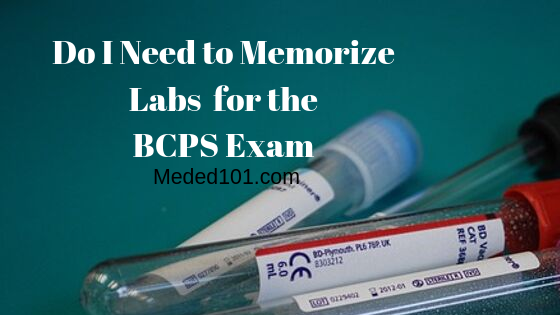We’ve been creating and updating content this fall and getting ready for 2020! Updates will be coming soon as they do every year at this time. BCMTMS (discount ends tomorrow) was just done and BCPS, BCACP, BCGP will be done within the next few weeks! As test time approaches, one of the most frequent questions I get about the BCPS and other BPS exams is; Do I need to memorize labs for the BCPS exam?
Should I Memorize Labs for my Exam?
The short answer is absolutely YES! You should definitely have a handle on common labs. At an absolute minimum, I would encourage having an understanding of routine labs like electrolytes, renal function, liver function, and CBC. In addition, I think of other labs that come up pretty regularly in practice; TSH, A1c, ferritin, pH, ABG’s and cholesterol are a few other common ones that come to mind.
With labs, I would also remember classic medications that require laboratory monitoring or at least target levels or values in which toxicity is likely. Lithium, digoxin, warfarin, valproic acid, carbamazepine, vancomycin, aminoglycosides, and phenytoin are a few common examples. I cover these in our study materials. Global RPh has a nice compilation of labs that you can check out.
That’s great info for the BCPS exam…but should I Memorize Labs for BCGP, BCACP, BCOP, or any other BPS exam?
Yes. You absolutely should be able to recognize when you are presented labs that are not within the normal range. This is true for ALL BPS Exams. If you are taking any of these exams listed below, you should have a decent understanding of routine lab values.
Common BPS Exams
- Ambulatory Care
- Pharmacotherapy
- Geriatrics
- Critical Care
- Pediatrics
- Psychiatry
- Infectious Disease
- Cardiology
- Link to list of all specialty exams under the BPS umbrella
I would also strongly encourage you to have an understanding of what is clinically significant. Is a potassium level of 5.4 a huge deal? It may be a minor concern, but if you compare it to that same patient who may have a sodium level of 112, you should be able to assess which lab value needs to be your priority. In addition, I’d recommend that you be able to recognize the clinical risks when lab values get out of range.
Here’s the official language I received from this question.
Throughout all BPS specialty certification examinations, all measurements from laboratory test results are expressed in traditional U.S. units. A conversion chart will NOT be offered as part of the examination. A reference table of normal lab values is NOT provided. Candidates should take this into consideration when preparing for the examination.
Hopefully, this helps to clear up the question of whether or not you need to memorize labs for the BCPS exam! If you are looking for more resources for your BCPS, BCGP, BCACP or other exams, you can check out our growing and most updated list here!



I’ve heard of people who didn’t memorize their labs and managed to swing it, but I definitely wouldn’t recommend doing that unless you’re some kind of super genius.